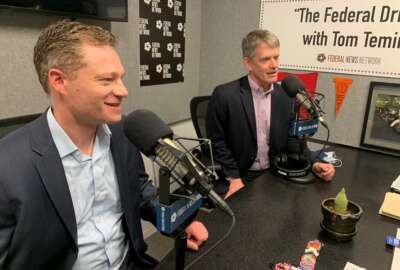To listen to the Federal Newscast on your phone or mobile device, subscribe in PodcastOne or Apple Podcasts. The best listening experience on desktop can be found using Chrome, Firefox or Safari.
- The House passed a nine-week continuing resolution that would keep agencies running through Dec. 3. It also includes a temporary suspension of the debt limit through December 2022 and nearly $29 billion in additional disaster relief funding. But it’s unclear the continuing resolution has enough votes to pass the Senate. No House Republicans voted to advance the CR. Senate Minority Leader Mitch McConnell (R-Ky.) and Appropriations Chairman Richard Shelby (R-Ala.) introduced their own CR that doesn’t include a debt ceiling suspension. (Federal News Network)
- Ten House Republicans want to know why more federal employees aren’t working in person. They say the Office of Personnel Management and Office of Management and Budget have clearly outlined a plan for agencies to increase on-site capacity. But they continue to field constituent complaints about customer service options at the Social Security Administration and other agencies. They want Oversight and Reform Committee Chairwoman Carolyn Maloney (D-N.Y.) to call a hearing on the topic.
- The Labor Department is collecting ideas to make federal contracting more equitable and accessible. Labor launched an ideascale platform asking for feedback on how agencies can do more to reach underserved communities and improve existing federal contracting assistance programs. Citizens, businesses and other stakeholders can submit ideas or vote on concepts submitted by others as as part of the effort. The federal contracting dialogue is one of five efforts to help meet the goals of President Joe Biden’s January executive order advancing equity and inclusion in federal programs.
- Apprentices are back in vogue at the Labor Department, thanks to a new advisory committee. It’s not a revival of a Donald Trump television show. The Labor Department appointed 29 members to its Advisory Committee on Apprenticeship, which President Biden revived back in February. Committee membership includes employers, unions and associations plus several ex-officio federal officials. The committee’s purpose is to recommend ways to promote the apprentice training model as a good career path. The committee will hold its first meeting Oct. 6.
- A bill to support diplomats and intelligence personnel suffering from a mysterious illness called Havana Syndrome now heads to President Joe Biden’s desk. The House passed the HAVANA Act, after it cleared the Senate in June. The legislation authorizes the CIA and State Department to offer additional financial support to employees suffering from brain injuries likely caused by Havana Syndrome. The condition first emerged in 2016, with 40 U.S. embassy staff in Havana reporting dizziness, tinnitus, visual problems, vertigo and cognitive problems.
- The Pentagon awards a contract to completely replace the aging Defense Travel System. DTS – widely regarded as one of DoD’s least user-friendly IT systems – will be replaced with a Software-as-a-Service platform made by SAP Concur. DoD’s version will be called “MyTravel.” DoD signaled earlier this year it planned to move forward with the replacement, but a sole-source contract the department signed with SAP last week makes it official. The Pentagon has been using the system as part of a pilot project since 2018, and expects to completely replace DTS by fiscal year 2025.
- The Space Force released prototypes of its first service uniforms. The clothing sports a nearly black coat with six diagonal buttons and an upturned collar. The six buttons represent the Space Force as the sixth branch of the armed forces. Guardians will wear ties underneath the uniform. Chief of Space Operations General Jay Raymond said the service is accepting tweaks and comments on the prototype.
- The Space Force is planning to be the employer of the future with its new human capital strategy. The nation’s newest military service is taking a very non-military approach to talent management. The Space Force wants to embrace a new way forward by prioritizing work-life balance and giving guardians options to follow the careers they aspire to most. The service will provide mentorship and developmental advice to its service members. Guardians will be able to adjust job pathways throughout their careers as well. It will also use data to help guardians better their daily routines and build toward their goals. The service currently employs about 12,000 service members and civilians. (Federal News Network)
- The Department of Homeland Security is in the middle of a 60-day “cyber sprint” to improve the cybersecurity of the U.S. transportation system. DHS Secretary Alejandro Majorkas told a Senate committee that the new effort will build on lessons learned from May’s Colonial Pipeline ransomware attack and subsequent security directives issued by the Transportation Security Administration. It’s the fourth cyber sprint DHS has undertaken this year, with previous efforts focused on issues like workforce development and ransomware.
- Government risk experts said their agencies face a higher risk of fraud now than before the COVID-19 pandemic. More than 300 survey respondents told the Association of Government Accountants and Guidehouse the most common sources of fraud and waste are benefit payments, payroll and vendor purchases of personal protective equipment during the pandemic. More than a third of federal, state and local entities said they haven’t implemented technology in their anti-fraud programs.
- GSA tries to take the buzz out of zero trust. As nearly every agency accelerates their journey to a zero trust cybersecurity architecture, the General Services Administration is offering some much needed help. GSA released a zero trust buying guide that outlines key considerations when purchasing products and services that make up this approach. The guide, which brings together zero trust approaches from NIST and industry, details the components and component descriptions across the eight pillars of zero trust like users, data, devices and infrastructure. GSA said agencies should consider how well the product or service addresses the eight pillars and to what extent as they are making buying decisions.
- Check off another milestone for implementing the Evidence-Based Policymaking Act. The Office of Personnel Management identified 25 different competencies it believes are necessary to do program evaluation work in the government. OPM will also solicit feedback from employees and supervisors about the skills they believe are necessary to succeed in this line of work. Surveys go out to the federal program evaluation workforce this week. OPM said it’ll use the feedback to develop a program evaluation competency model and other HR policies.
- A supply chain task force is out with new suggestions on how to get the government and industry to share more information. Private companies need fine-tuned liability protections if the government wants them to share information about risks in the information and communications technology supply chain. That’s according to the ICT Supply Chain Risk Management Task Force, a public-private group convened by the Cybersecurity and Infrastructure Security Agency. The task force’s new report offers potential legal remedies to those liability concerns as the Biden administration considers its strategy for addressing risks in the global tech supply chain.
- The IRS is chipping away at its backlog of tax returns. It’s cut its tax return backlog in half over the past three months, but the agency still has nearly 18 million cases it needs to process. The National Taxpayer Advocate said staffing shortages, antiquated IT and legislative changes made in the middle of the filing season all contributed to delays. The IRS expects to receive another four million tax returns before the extended filing season deadline on Oct. 15.
- The annual Combined Federal Campaign kicks off this month. Interior Secretary Deb Haaland and Office of Personnel Management Director Kiran Ahuja are this year’s honorary chairwomen. The campaign gives federal employees an annual opportunity to donate to hundreds of charities through payroll deduction or make a one-time gift through the CFC online platform. Employees can also volunteer their time. The CFC runs through Jan. 15. (Federal News Network)
Copyright
© 2024 Federal News Network. All rights reserved. This website is not intended for users located within the European Economic Area.



